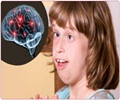Researchers at Stanford University School of Medicine and Lucile Packard Children's Hospital Stanford suggest that a deficiency of oxytocin was not solely responsible for autism.

A paper describing the new findings will be published online Aug. 4 in Proceedings of the National Academy of Sciences.
Although autism was not directly linked to oxytocin deficiency, the Stanford team found that higher oxytocin levels were linked to better social functioning in all groups. All children with autism have social deficits, but in the study these deficits were worst in those with the lowest blood oxytocin and mildest in those with the highest oxytocin. In the comparison groups, children's social skills also fell across a range that correlated to their oxytocin levels.
"Oxytocin appears to be a universal regulator of social functioning in humans," said Karen Parker, PhD, assistant professor of psychiatry and behavioral sciences and the lead author of the study. "That encompasses both typically developing children as well as those with the severe social deficits we see in children with autism."
Autism is a developmental disorder that affects 1 of every 68 children in the United States. It is characterized by social and communication deficits, repetitive behaviors and sensory problems. The new study included 79 children with autism, 52 of their unaffected siblings and 62 unrelated children without autism. All of the children were between the ages of 3 and 12.
"It didn't matter if you were a typically developing child, a sibling or an individual with autism: Your social ability was related to a certain extent to your oxytocin levels, which is very different from what people have speculated," said Antonio Hardan, MD, professor of psychiatry and behavioral sciences and the study's senior author. Hardan is a child and adolescent psychiatrist who treats children with autism at the hospital.
Advertisement
The researchers caution, however, that blood oxytocin measurements may be different than oxytocin levels in the cerebrospinal fluid bathing the brain, which they did not measure.
Advertisement
The team also discovered that blood levels of oxytocin are highly heritable: The levels are influenced by inheritance to about the same degree as adult height, which is often described as being strongly influenced by genetics.
"What our study hints at is that social function may be heritable in families," Parker said.
The study will help to guide future research to determine whether oxytocin is a useful autism treatment. The study's findings suggest that some children with autism — such as the subset of kids with autism who have naturally low oxytocin levels, or those with oxytocin receptor gene variants associated with worse social functioning — might benefit most from oxytocin-like drugs.
"Autism is so heterogeneous," Parker said. "If we can identify biomarkers that help us identify the patients most likely to benefit from a specific therapy, we expect that will be very useful."
Source-Eurekalert













